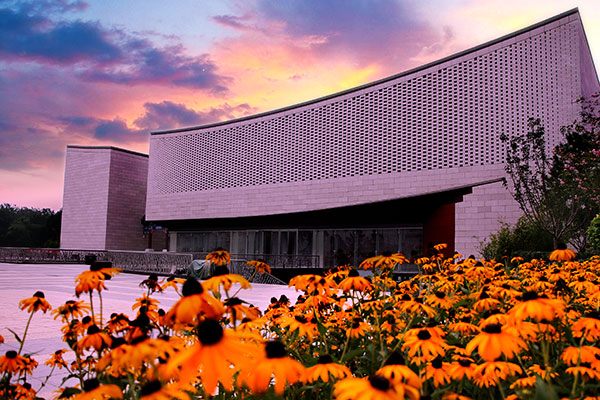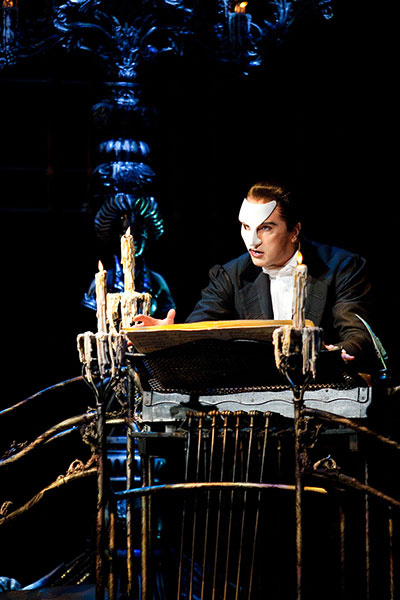
The Tianqiao Performing Arts Center.[Photo/China Daily]
Before Beijing had grand cultural venues like the National Center for the Performing Arts, and popular commercial areas such as Sanlitun, there was Tianqiao, once a destination for folk arts and small businesses in the late 19th and early 20th centuries.
Located in the capital’s downtown, people could find pet markets and teahouses, and enjoy performances of cross-talk shows, acrobatics and operas. However, this landmark from an earlier chapter of Beijing’s history was threatened by the country’s fast development and urbanization.
In response, the local government launched a project four years ago to help restore the glory of Tianqiao. On Nov 20, a new structure was unveiled: the Tianqiao Performing Arts Center.

The Phantom of the Opera is now being staged at one of Beijing’s newest cultural venues, the Tianqiao Performing Arts Center.[Photo/China Daily]
Covering more than 16,000 square meters, the venue has four theaters; the biggest has a capacity of 1,600 and the smaller ones each cater to around 300 people. Additionally, the outdoor square outside the venue also serves as a place for arts and entertainment for the general public.
“We look at the Tianqiao Performing Arts Center as a major draw to the area and as a step for a revitalization of the area,” says Tian Yuan, general manager of the center.
“It’s not just a place for shows at night but also a new venue, where you can enjoy arts in the daytime by attending exhibitions and music workshops.”
Located on Zhongzhou Road, or the central axis, a main north-south road through the capital, the center is close to the Temple of Heaven, one of the most popular tourist sites in Beijing.
According to Tian, the biggest theater is designed as a venue for musicals since the art form is “great family entertainment and caters to audiences of a wide age range”.
The opening show is Andrew Lloyd Webber’s musical, The Phantom of the Opera, which is ongoing at the venue through Jan 10. One of the most successful musicals in the world, Phantom premiered in London’s West End in 1986 and has played more than 70,000 shows in 29 countries.
Phantom made its debut on the Chinese mainland in 2004 at the Shanghai Grand Theater and then returned to the city in 2013. It also visited Guangzhou this fall.
“It took years for us to finally bring the show to Beijing,” says Tian, who has since 1999 been in discussions to bring the show to the capital with the musical’s London-based production company, Really Useful Group, which Webber founded in 1977.
However, a suitable theater for the stage setting had been lacking until now.
“With The Phantom of the Opera, it’s quite thrilling to be in this new venue to deliver what we have been delivering in the world,” says Kerry Comerford, vice-president, Asia Pacific, of the production company.
“We have been involved in more than 450 seasons in cities throughout the world during the last 22 years. Over 160 of those seasons have been in the Asian region and a third of those have been in China. It’s quite a big sector of our activity,” she says.
Back in 2001, the company worked with China Performing Arts Agency to bring two shows of The Music Of Andrew Lloyd Webber to Beijing and Shanghai.
“This project was specifically designed for China. We wanted to find a way to expose Chinese audiences to the varied range of musicals of Webber,” Comerford says.
Those shows launched long-term cooperation between Really Useful Group and the China Performing Arts Agency, including tours of Cats and The Sound of Music. Comerford also led the production of the first Chinese-language Cats, which toured 10 cities in China in 2012.
Andrew Treagus, executive producer of the company that teamed up with the Chinese agency in 2007 to bring the global hit musical Mamma Mia! to Beijing and Shanghai in 2007, agrees that musicals have a future in China. After the success of Mamma Mia! the company, Littlestar Services UK, produced a Chinese-language version of the show in 2010.
Besides The Phantom of the Opera, initial performances at Tianqiao Performing Arts Center will see a variety of performances from productions, including veteran director Tian Qinxin’s dramatic work Beijing Fayuan Temple, and the multimedia show Cinematique by French artists Adrien Mondot and Claire Bardainne.
Yang Lan, a media guru and the host of a forum for the center’s opening, mentions that the Lincoln Center for the Performing Arts is one of those places everybody goes to, no matter where they come from.
“I hope that we could have a place like the Lincoln Center for the Performing Arts in China, which emotionally unites the people who really understand the arts,” Yang says.
If you go
The Phantom of Opera Daily through Jan 3. Beijing Tianqiao Performing Arts Center, 1 Tianqiao South Street, Xicheng district, Beijing. 400-635-3355.
